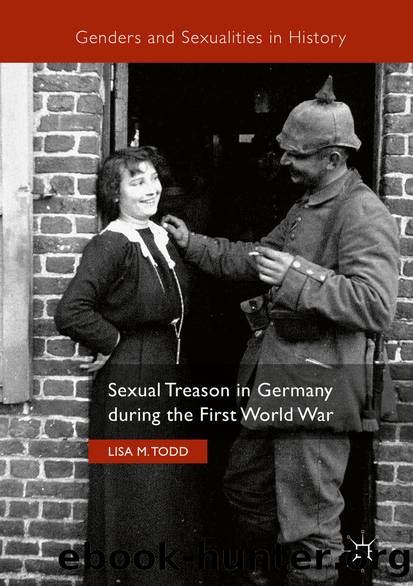Sexual Treason in Germany during the First World War by Lisa M. Todd

Author:Lisa M. Todd
Language: eng
Format: epub
Publisher: Springer International Publishing, Cham
The Bishop of Wurzburg instructed his clergymen to âadmonish and instructâ their parishioners that the issue was an important spiritual question, and one that had grave consequences for the morality and religion of the German nation. âThe entire Christian nationâ, he wrote, âmust know that it is crucial for us, both as individuals and as a group, to continue to warn against âfreeâ relations between the sexes.â 36 This reference to âfree relationsâ was a thinly veiled attack on sexual reformers such as Helene Stöcker: no doubt it resonated well with the Bishopâs parishioners and those who read his comments in the local newspaper.
Despite such freely offered advocacy and support from German citizens across the Reich, the military authorities decided that the most effective way to curb illicit sexual relationships was to make them illegal. From a legal perspective, this was a relatively straightforward process. With arguments that pointed out the dangers of espionage, of diseases such as lice, typhus and cholera, and of escaped prisoners, military authorities in many districts began introducing regulations based on the Prussian Siege Law of 1851 which curtailed contact between civilians and prisoners. 37 The authorities placed notices in local newspapers to remind Germans that unnecessary contact between civilians and prisoners could be punishable by fines or imprisonment. Thus, in February 1915, the Deputy General Commander of the First Bavarian Army Corps warned that the following activities could be punishable by up to one yearâs imprisonment: meeting a prisoner, helping to set up meetings between unauthorized civilians and prisoners, giving gifts of any kind to the prisoners or helping prisoners escape from either their place of work or the prison camp. 38 Likewise, the Chief Army Commander in the Mark Brandenburg reminded the readers of the Berliner Tageblatt in August 1915 that persons could be punished under Sections 120, 121 and 257 of the Reich Criminal Code for providing working prisoners of war with foodstuffs, money, clothing or items that âcould help facilitate an escapeâ. 39
The laws were evidently broad enough to allow arrest of hundreds of women suspected of cavorting with prisoners. However, there were still cases of âimmoralâ women escaping jail time. For instance, the Konitzer Zeitung reported the following case: a woman on her way home from errands encountered a French prisoner of war working on the street. The two fell into conversation about how German prisoners were treated so poorly in France while French prisoners were treated so well in Germany (a popular wartime topic). Because of this brief conversation, the woman was arrested and brought before a Bavarian provincial court judge. The judge found her not guilty because he did not feel that a short exchange of words contravened the ban against civilian relations with foreign prisoners. To the judge, only an âexcessively friendly or suggestiveâ conversation or sexual relations were punishable by law. 40 However, Bavarian wartime law only stipulated that civilians should not have âunauthorized contactâ with the prisoners. Such a vague term left ample room for local law enforcers to interpret the law as they saw fit.
Download
This site does not store any files on its server. We only index and link to content provided by other sites. Please contact the content providers to delete copyright contents if any and email us, we'll remove relevant links or contents immediately.
| Africa | Americas |
| Arctic & Antarctica | Asia |
| Australia & Oceania | Europe |
| Middle East | Russia |
| United States | World |
| Ancient Civilizations | Military |
| Historical Study & Educational Resources |
The Light of Days by Judy Batalion(827)
Stalin's War: A New History of World War II by Sean McMeekin(687)
Walk in My Combat Boots by James Patterson(613)
The Pacific War 1941-1943 by James Holland(608)
Victory's Price (Star Wars) by Alexander Freed(576)
The Vietnam War: An Intimate History by Geoffrey C. Ward & Ken Burns(568)
First Platoon: A Story of Modern War in the Age of Identity Dominance by Annie Jacobsen(562)
Cold War (Alexander King Book 2) by Bradley Wright(557)
The American War in Afghanistan by Carter Malkasian(555)
Operation Pedestal by Max Hastings(538)
Blood and Ruins: The Great Imperial War, 1931-1945 by Richard Overy(530)
The Madman Theory by Jim Sciutto(521)
Concepts of Space by Jammer Max;(515)
Extreme Fitness by Chris McNab(514)
World War II Infantry Fire Support Tactics by Gordon L. Rottman(501)
Flying Tiger by Samson Jack(500)
Pathfinders by AL-KHALILI JIM(496)
Panzerkrieg by Mike Syron(488)
Hitler’s Pre-Emptive War: The Battle for Norway, 1940 by Henrik O. Lunde(484)
